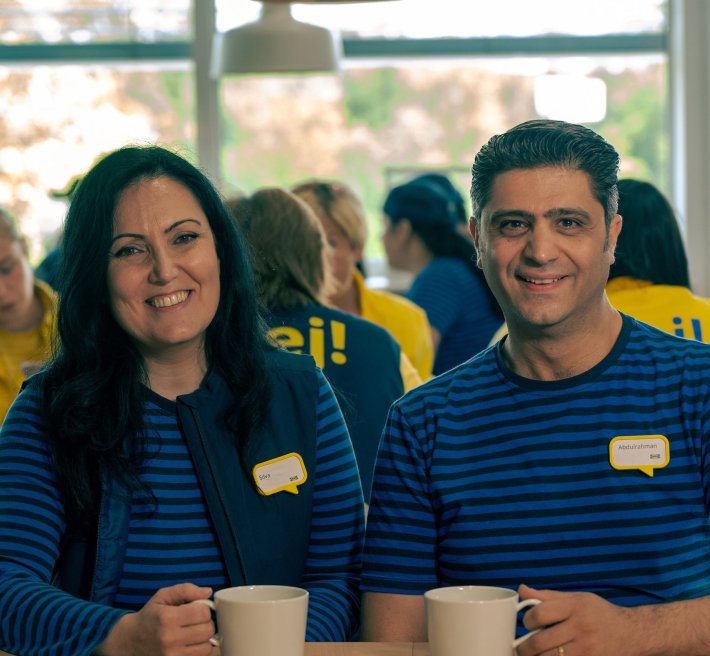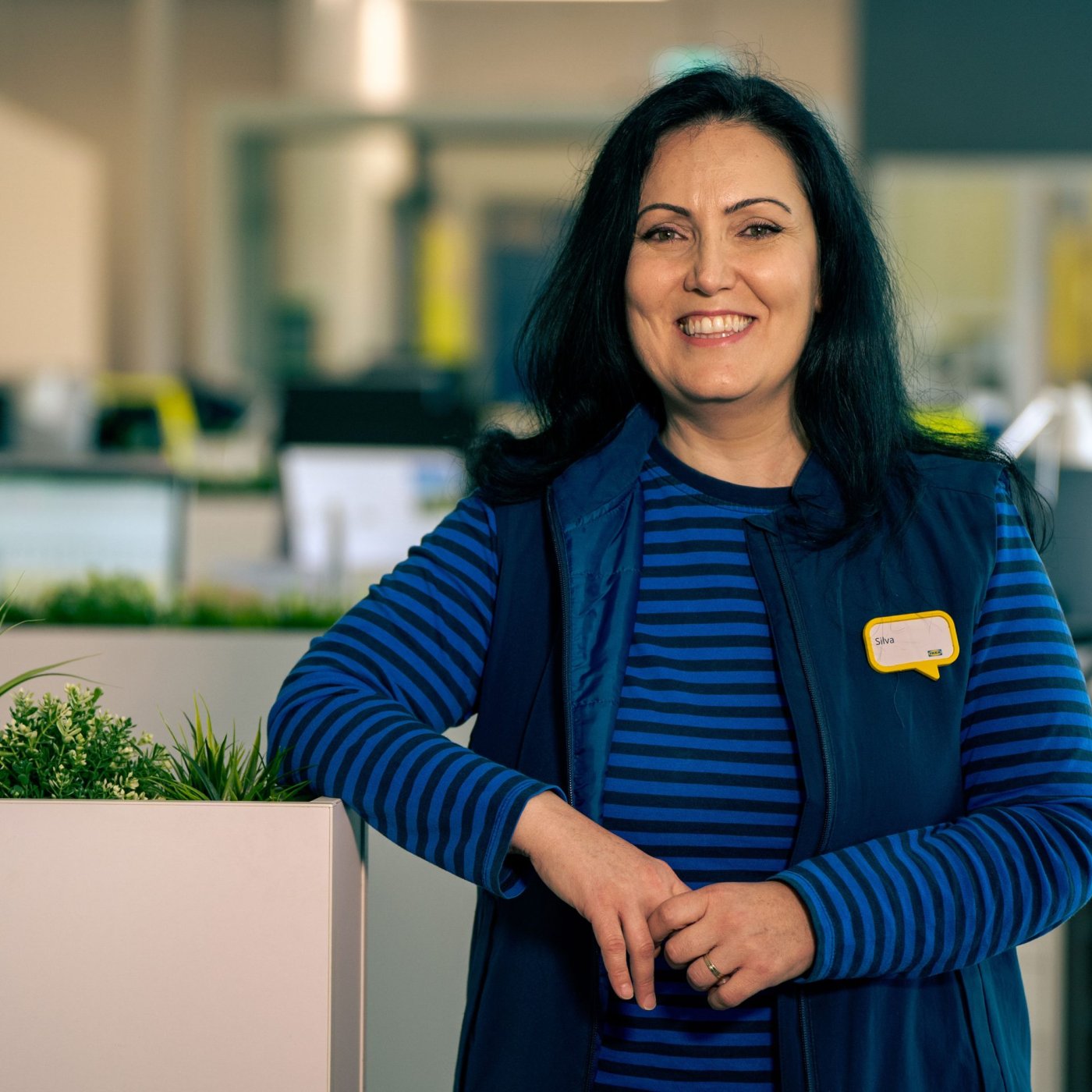Skills for Employment
Yana’s story
Read Yana’s journey that shows the power of work to rebuild a life.

Silva and Abdul, a married couple from Syria, built a successful business together before war forced them to flee.
Silva:
My family is Armenian. We have been refugees for generations. I grew up in Syria with Lebanese nationality. That made life hard because everything we did required official approval. We always had to take our papers to the security agencies. Despite that, I managed to go to school and university. I graduated as an interior designer and began working at a furniture company. That’s where I met Abdul. At first, he was like a brother to me.He reminded me of my father—calm, kind, and always looking out for me. In my family, we were five sisters with no brothers, so I never knew what it was like to have a man supporting me in that way. Abdul was always there, fixing my car, helping me whenever I needed him. I felt safe with him.
Abdul:
The moment I saw Silva, I fell in love. I tried everything to make her love me back, but it’s not easy in the Middle East to pursue a woman. I had to be patient. In our culture, there are many traditions to respect. But I was young and I never gave up. I kept showing her how much I cared for her until, finally, she loved me back. Ours was not an easy love story. We came from different backgrounds, different societies. But we believed in love—love that was stronger than traditions, stronger than war, stronger than fear. We built something together, not just a relationship, but a company, a life. We became business partners, turning my skills in marketing and management and her design talent into something real and successful.
Silva:
I had always dreamed of having my own furniture company, like IKEA. Abdul made that dream come true. With the help of a wealthy investor, he made it possible for us to establish our own company. Step by step, we built our name, and soon, I became well-known. I was invited to host a TV show about interior design on a morning programme. Life was good, but it was never easy. We worked day and night, struggling to build something lasting. Then the war came. And in an instant, we lost everything. Our factory, our warehouse, our business—it was all destroyed. We tried to start again in Damascus, but the war followed us there too. Twice, we built something, and twice, we lost it all. We were living day by day, just trying to survive.
Abdul:
The war changed everything. Rockets fell around us. Car bombs exploded nearby. We were lucky—so many people didn’t survive. It was difficult because our factory didn’t have electricity and we couldn’t bring in the raw materials. People were leaving Syria, or being conscripted into the military. Building our company and working on our project became high risk. But, despite that, we did it. That memory means a lot to us.
Silva:
It was not easy for me to go against my parents. Everyone thought our love was crazy. But there was one day I knew I would be with Abdul for life. We had no fuel and we were on our way to work. Abdul didn’t like me travelling alone, so he was beside me. We didn’t have a car so I decided to take a bus. That was like Mission Impossible at that time, but I found one. The bus was crowded and Abdul insisted we wait for another one. While we were waiting there was a big explosion from a bomb. Everything went black and the bus was upside down.
At this moment I realised Abdul had saved me from death. He is my angel and he should always be in my life. There and then I told him I would marry him, whatever it takes. Within a week of our getting married, on our honeymoon, I got a call and I was told, “Silva don’t come back because it’s not safe for you. You will be dead in a minute.” We closed the company. Our first dream was gone. But we had each other and we began life as asylum seekers.
Abdul:
Leaving was not easy. We had lost everything, and now we had to start from nothing. But it was worse than nothing. We had no language, no understanding of how to find work, rent a home, or integrate into this new world. We were under zero. At first, I worked as a tour guide. It wasn’t a big salary, but at least I had something. Then COVID-19 hit, and I lost my job. When our son, Sam, was born, I had no work. It was horrible. I was terrified that he would grow up seeing his father without a job, thinking that was normal. I was desperate to find something, anything.
Then, someone told me that IKEA was offering language courses and training for refugees. I couldn’t believe it. IKEA had always been our inspiration. I signed up immediately. After three interviews, they gave me a chance. Not a job—a chance. They told me, “If you prove yourself, you can stay.” And I did. I grabbed that chance with both hands. It felt like someone had pulled me out of a fire.

Silva:
IKEA didn’t just give Abdul a chance. They gave our family a future. Once I got my permanent residence, I applied for a position in the visual department. They saw my background as an interior designer and offered me a role that suited my skills. Even though my Czech wasn’t perfect, they helped me work in English. We felt welcomed, respected. Now, even our son dreams of being part of IKEA. He told me the other day, “Mommy, I want to be a robot designer in IKEA when I grow up!” We laughed, but I realised—this is his home. He has a future here. And that means everything.
Abdul:
Syria will always be our homeland, but Europe gave us life again. It gave us safety. But we can work with Syria, support the people there, and build something new, from a place where we are safe. IKEA saved me. They gave me the chance to prove myself. To show that I am not just a refugee—I am a worker, a builder. They didn’t give me charity. They gave me dignity. And that is something I will never forget.
Silva:
For years, we had no dreams. Our only dream was to wake up the next day. Now, we dream again. We build again. And we do it together. Our work environment makes us feel like this is home. One day, our son said, “Mummy, I’m going to kindergarten now, but when I grow up, I will go with you to IKEA.” Being able to work here is like a lifeline. It’s a life inside a life. I don’t think I could find a better place for my son to have a future.